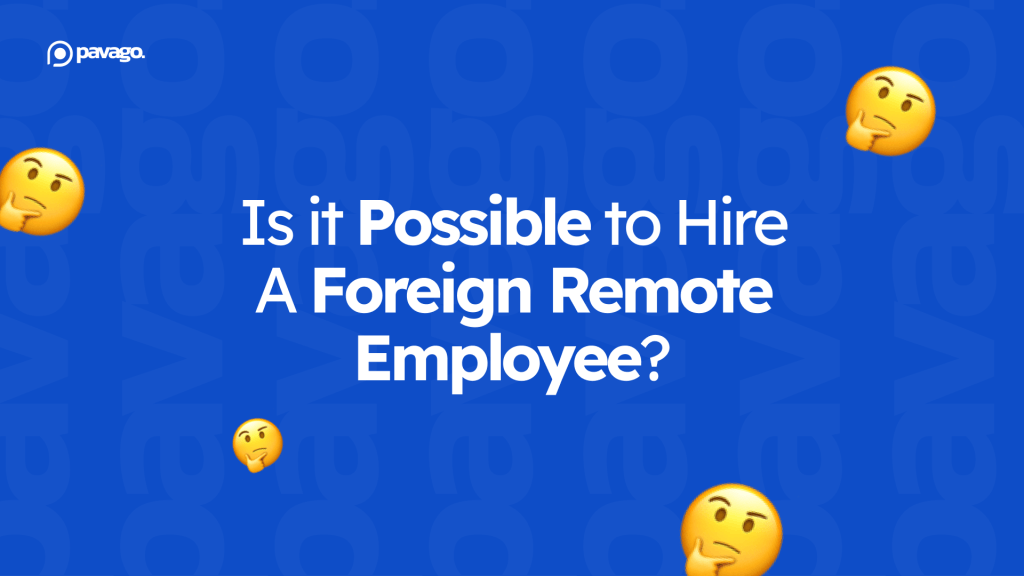Hiring the best talent doesn’t have to be limited by geography.
If you’re a U.S.-based business owner, the idea of hiring remote employees from other countries might seem daunting at first, but it’s becoming more common (and more accessible) than ever before. Deel’s State of Global Hiring Report found that 64% of US companies have expanded or plan to hire foreign employees.
Whether you’re looking to tap into specialized skills, reduce overhead costs, or just expand your team globally, hiring foreign employees remotely could be the right solution for your business.
But how does it actually work? What should you know about navigating legal, financial, and logistical challenges when hiring across borders?
In this guide, we’ll break down everything you need to know to hire remote employees and how to make it a smooth process for your business.

How to Hire Remote Foreign Employees
So, can you hire employees from other countries to work remotely? The short answer is yes.
U.S. companies have several avenues to hire remote foreign employees, each with its own set of advantages and challenges:
1. Establish a Legal Entity Abroad
Setting up a subsidiary or branch in a foreign country allows a company to hire employees directly. This approach provides full control over operations and compliance but involves significant investment and administrative overhead.
2. Partner with an Employer of Record (EOR)
An Employer of Record is a third-party organization that legally employs workers on behalf of a company. The EOR handles all employment-related tasks, including payroll, taxes, benefits, and compliance with local labor laws, allowing the company to focus on its core operations.
3. Engage Independent Contractors
Hiring independent contractors is a flexible and cost-effective option. Contractors manage their own taxes and benefits, reducing the employer’s obligations. However, it’s crucial to ensure proper classification to avoid misclassification risks, which can lead to legal and financial penalties.
Comparing The Options
| Method | Pros | Cons | Ideal For |
|---|---|---|---|
| Legal Entity Abroad | Full control, direct employment | High setup and maintenance costs | Long-term presence in the country |
| Employer of Record (EOR) | Simplified compliance, quick setup | Ongoing service fees | Short to medium-term international hires |
| Independent Contractors | Flexibility, lower costs | Limited control, potential misclassification risks | Project-based work or specialized tasks |
Factors to Consider When You Hire Foreign Employees
There are certain things you need to know when hiring employees from another country.
Legal and Compliance Considerations
- Permanent Establishment Risk: Having employees in a foreign country may create a “permanent establishment,” subjecting the company to local corporate taxation.
- Labor Laws: Each country has its own labor laws regarding contracts, benefits, working hours, and termination procedures.
- Tax Obligations: Companies must understand the tax implications in both the U.S. and the employee’s home country.
- Benefits and Insurance: Providing statutory benefits and insurance as required by local laws is essential.
✌️ Partnering with an EOR like Pavago can mitigate these challenges, as we ensure compliance with local regulations on your behalf.
Financial and Logistical Considerations
- Payroll Management: Paying employees in foreign currencies and managing cross-border payments can be complex. Utilizing platforms that facilitate international payroll can streamline this process.
- Time Zone Coordination: Managing teams across different time zones requires effective communication and scheduling tools to ensure collaboration.
- Cultural Differences: Understanding and respecting cultural differences can enhance team dynamics and productivity.

What Roles Can I Offshore Easily?
Offshoring enables U.S. companies to access a global talent pool, often at a lower cost, without compromising on quality. Here are some key roles that are you can hire foreign employees for:
1. SDRs & BDRs
Offshoring SDRs and BDRs allows companies to expand their sales outreach without the overhead costs associated with in-house teams. These roles are essential for lead generation and initial client engagement, making them ideal for offshoring.
Related: SDRs vs. BDRs: What’s the Difference?
2. Customer Support Agents
Providing 24/7 customer support is crucial for businesses with a global clientele. Offshoring customer support roles to regions with a strong English proficiency and cultural alignment ensures high-quality service at reduced costs.
3. Digital Marketers
Digital marketing encompasses SEO, content creation, social media management, and paid advertising. Offshoring these functions allows businesses to leverage specialized skills and stay competitive in the digital landscape.
4. Software Developers
The tech industry has seen a significant shift towards offshoring software development. Countries like India, the Philippines, and various Latin American nations offer a wealth of skilled developers proficient in various programming languages. This trend is driven by cost efficiency and the need for diverse expertise.
Related: Top 10 Tech Recruiting Companies in the U.S. [2026]
5. Accounting and Finance Professionals
Offshoring accounting tasks, including bookkeeping, tax preparation, and financial analysis, can lead to significant cost savings. Countries with strong financial expertise offer reliable services that adhere to international standards.
6. IT Support and Network Administrators
When you hire foreign employees for IT support roles, you ensure that technical issues are addressed promptly, often around the clock. This is particularly beneficial for companies operating in multiple time zones.
Related: Best IT Staff Augmentation Companies for 2026
7. Administrative Assistants and Virtual Assistants
Administrative tasks like scheduling, email management, and data entry can be offshored to virtual assistants and executive admin assistants. This frees up time for executives to focus on core business activities.

Frequently Asked Questions
1. What is an Employer of Record (EOR)?
An EOR is a third-party organization that legally employs workers on behalf of a company. The EOR handles all employment-related tasks, including payroll, taxes, benefits, and compliance with local labor laws.
2. Can a U.S. company hire foreign employees without establishing a legal entity abroad?
Yes, partnering with an EOR allows a U.S. company to hire remote employees in foreign countries without the need to establish a local entity.
3. Are there tax implications for hiring remote foreign employees?
Yes, companies must understand the tax implications in both the U.S. and the employee’s home country. An EOR can assist in navigating these complexities.
4. How can a U.S. company ensure compliance with foreign labor laws?
Partnering with an EOR ensures compliance with local labor laws, as the EOR handles all employment-related tasks in the foreign country.
5. What are the benefits of hiring remote foreign employees?
Outsourcing staff as remote employees offers access to a broader talent pool, potential cost savings, and increased flexibility in operations.
Wrapping It Up
Hiring remote foreign employees offers U.S. companies the opportunity to tap into a global talent pool, enhance operational flexibility, and achieve cost efficiencies. However, it’s essential to navigate the legal, financial, and logistical challenges carefully.
Partnering with an Employer of Record can simplify the process, ensuring compliance and allowing businesses to focus on growth and innovation.
Pavago is an excellent choice as your Employer of Record.
With our deep expertise in offshore recruitment and compliance, we handle all the complexities of international hiring, from payroll to legal requirements, so you can focus on what truly matters: growing your business.
Let us help you hire foreign employees build a high-performing remote team without the hassle.
















